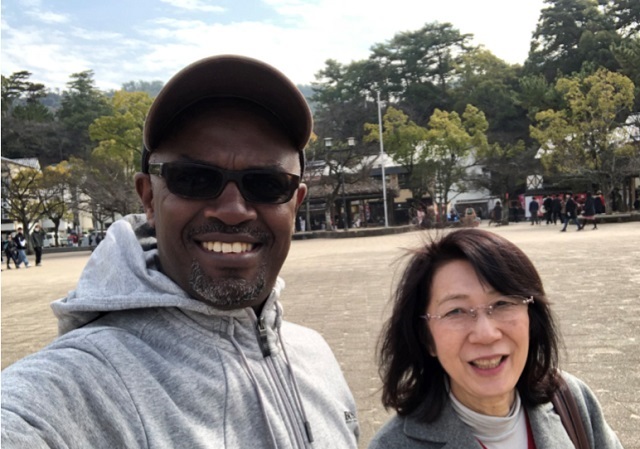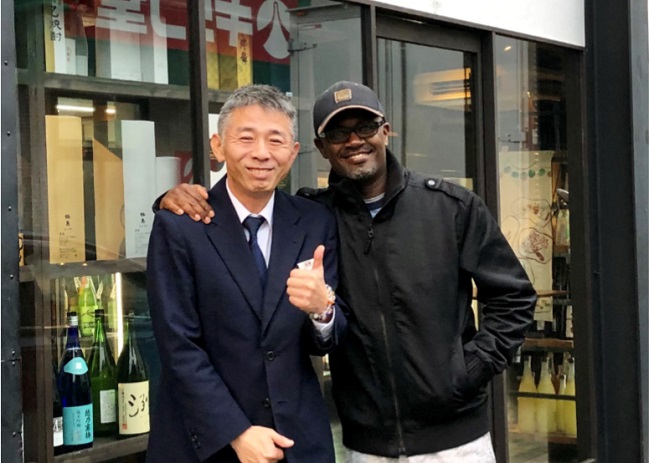
Throughout my stay in Japan and having visited about seven cities I could not find an obese person. Yet this is a rich country with a per capita GDP of $39,000 ($44,000 by Purchasing Power Parity). There are many countries in this income bracket, but most especially the USA, have high percentages of their people over weight. I searched online and found that only 3.6% of Japanese are obese. Indeed, 66.5% of Americans have a Body Mass Index (BMI) above 25 (making them overweight) compared to 25% in Japan.
Good diet makes Japanese look much young than their age. For all the time I spent in Japan, I hardly saw old people. Most people I met in offices, restaurants, markets, streets, museums etc. looked young. This was contrary to my first experience when I first visited Europe, the USA and Canada in the mid 1990s. Coming from a young country (the median age in Uganda is 14) where seeing elderly people is a rarity, I was intrigued by the mass of old people in airports – in Brussels, Paris, London, Toronto, New York, Washington DC etc. I wondered what possesses these elderly people to be traveling this much.
With time I realised that these nations have large percentages of their people in old age compared to Uganda. Therefore, the issue was not that old people in Uganda do not “roam around”. They are too few to be seen, only 4% of our population is above 60 years, 49% are below 14 years. Consequently, at every event little kids below 10 will outnumber the octogenarians by a big factor. Yet Japan, even with the highest population of elderly citizens in the world (33% are above 60 years), does not look old. I was intrigued.
I guess the trick is in Japanese diet, which is low on fat and high on protein. Being an island nation, Japanese eat largely fish and their cuisine has not suffered the introduction of oils and other fattening aspects. In fact Japanese are a contradiction: they have embraced many aspects of western culture yet at the same time retained many aspects of their traditional systems. In this regard Japanese are very much like Ugandans. For instance, Japanese eat their local cuisines yet they abandoned their traditional clothing (which I find elegant) for the Western suits, trousers and skirts and shirts and blouses.
Equally, the political system in Japan is Western liberal democracy but I guess it is held together by specific Japanese traditional values and norms. Japan does not have term limits; an obsession Africa borrowed from the USA which its intellectual elites worship like God. However, the ruling party, the Liberal Democratic Party (LDP) of Japan, used to have term limits. Two years ago, however, its current president, Shinzo Abe, amended the party constitution and removed term limits so that he can remain prime minister longer. There was hardly a hue and cry that he is power hungry.
More than that, the LDP has ruled Japan continuously since it’s founding in 1955. It has lost power – and only briefly – twice: 1993-94 and from 2009-2012. So it has ruled Japan for 59 of the 63 years since it was founded. To many Africans obsessed with Western democracy where political parties in power change hands regularly, Japan looks like the quintessential one party dictatorship. The only difference of course is that in Japan, prime ministers do not last long, often they rule for two or three years. Only Eisaku Sato (1964-72) did eight years, and Abe has done more than six.
Secondly, Japanese easily and quickly embraced and mastered Western technology without abandoning their religion and culture. The country remains predominantly Buddhist and Shinto. This is different from Uganda where Christianity and Islam actively fought and overwhelmed out traditional religions. Japan is also the only country I have visited where hardly anyone speaks English. I had to rely on interpreters for most of the time. While most Western liberal democracies have increasingly become multicultural, Japan remained ethnically and culturally homogeneous. Even in the face of a declining population, I did not see much desire to admit many foreigners into the country.
Japan is similar to Uganda on cultural preservation yet different on openness to foreigners. Ugandans have embraced Western education and religion, yet retained a lot of their cultures (look at our marriage ceremonies that mix traditional marriage –kwanjula, gubaba, kweranga etc. – with church weddings). We have also retained our cuisines (at our weddings we mix Western and traditional cuisines into one package) and have also retained our languages. However, Uganda is more accepting of foreigners: Rwandans, Congolese, Ethiopians, Eritreans and South Sudanese all come and settle in our country with little or no hostility.
Japanese are exceptionally polite and treat one another and even strangers with courtesy. I have not encountered a people as polite as the Japanese, perhaps South Koreans. The common feature of Japanese and Koreans is the speed in doing things. You call a waitress in a restaurant and she literally comes running at full speed to address your concern. It is rare for people to be polite and also quick. Yet Japanese (like Koreans) do things quickly and yet retain politeness. Is this a cause or consequence of their rapid development? This is a subject I will address in my next article.

****
 The Independent Uganda: You get the Truth we Pay the Price
The Independent Uganda: You get the Truth we Pay the Price



Change of mentality is as difficult as change of culture and requires relentless pursuance to realise expected change. It starts with values attached by an individual to the change needed and this determines how long it’s realised. For our country shouldn’t be attached to His excellency, the president of the Republic of Uganda but mentality, values…of individuals.
What a “Japanese escort?” But I don’t think she would give you more than what “badblack” would put on offer.
“I spent nine days with this lady, driving in the same car, having meals together, visiting museums, factories, theatres, libraries, site seeing around the different cities etc. She was very kind and patient with me, and friendly – a great host so to speak. Finally when I had to say bye to her, I behaved like a good American (or human being) would do. I went to a shop and bought her a gift. In America, tipping someone for a good service is basic courtesy; in fact it is impolite not to do so. But my Japanese escort was horrified (and I mean horrified) by this gesture and turned it down.”
THIS exposes your intellectual, and maybe diplomacy level.
This is the reason , in the good old days, those who were being sent to foreign missions would be sent for training , in seemingly such simple things as table manners.
Every society has its culture and expected behaviour and manners, and what may be ok in one society may not be in another sometimes to a point of being outright rude.
SO, having been a guest of such a country, rather than you visiting on your own or as a tourist, etiquette and common sense ( something you have severally emphasized that can be very rare most times) would have dictated that you take time to learn some of these things and with the modern WWW all you would have to do is to search “what to do and not to do while in JAPAN”
Believe me, the next time, the lady will use your story of buying her a present and forcing it upon her.She was just being polite by accepting it, and if you do not know etiquette , it is a telling sign when someone opens a present in front of you, the reason you wrap it in the first place, unless you insist on them opening it in your presence.